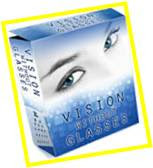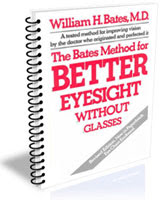Improve Your Eyesight Naturally
If you are thinking about how to improve your eyesight, look at how many people today are: wearing glasses, complain about memory loss and are under stress. Our eyes may be under pressure and are very possibly even in the process of suffering permanent damage.
The brain and the eyes work closely as a team. To keep the memory sharp, it is important to maintain excellent vision. Excellent vision, in turn, is maintained by a relaxed state of mind (and body). Consider the processing of information: The eyes have to first capture an image and focus on the shape, size, and colors. The mind needs to interpret that information and then store it for recall later. Everyday images take mere seconds to interpret and remember. New images take a little bit longer, depending on stress levels. The more focused the eyes are on an image, in a relaxed state, the stronger the memory will become.
In other words, the better an image is processed, the easier it is to recall later. The more relaxed the eyes are, the better they can absorb an image. Too much stress and strain on the eyes may result in a decline in memory retention. Vision and mental focus go hand in hand and both are negatively impacted by strain and stress, so a program for better vision is a must.
Exercises To Improve Vision
To test the condition of the eyes, try these mental memory exercises in which the goal is to maintain a visual image for as long as possible:
Strategy 1:
Cover one eye and glance quickly at a letter on the page with the other eye. Now, close both your eyes and hold the image of the letter in your mind as long as possible. Count how many seconds the image stays in your mind before fading away to darkness. Take note of this number. Do the same thing for the other eye and compare the results.
Strategy 2:
As you inhale, picture the number 4. Again, picture the number completely while you exhale. Really see the lines, the black color and the shape; don’t stop picturing the number until all the air has left your lungs and the next breath comes naturally. Do this all the way down to 0.
Such simple strategies will allow you, in time, to visualize images in the mind more clearly and at the same time, increase awareness of the need to relax in order to improve recall. Remember: Vision affects memory. The more clearly we see the image, the more detail we can recall later. That ability to recall well, is a function of keeping the mind relaxed and the eyes free of strain. Relaxation, good vision and good memory all go hand in hand.
http:www.relearningtosee.org













